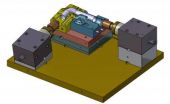(Press-News.org) AUGUSTA, Ga. – While powerful magnetic stimulation of the frontal lobe of the brain can alleviate symptoms of depression, those receiving the treatment did not report effects on sleep or arousal commonly seen with antidepressant medications, researchers say.
"People's sleep gets better as their depression improves, but the treatment doesn't itself cause sedation or insomnia." said Dr. Peter B. Rosenquist, Vice Chair of the Department of Psychiatry and Health Behavior at the Medical College of Georgia at Georgia Health Sciences University.
The finding resulted from a secondary analysis of a study of 301 patients at 23 sites comparing the anti-depressive effects of the Neuronetics Transcranial Magnetic Stimulation Therapy System to sham (placebo) treatment in patients resistant to antidepressant medications. TMS sessions were given for 40 minutes, five days a week for six weeks. Initial findings, published in the journal Biological Psychiatry in 2007, were the primary evidence in the Food and Drug Administration's approval of TMS for depression. The secondary review reaffirmed TMS's effectiveness in depression but revealed no differences in rates of insomnia or sleepiness among those who got actual and sham (placebo) therapy. Patients in the treatment group were also no more likely to request medication for insomnia or anxiety.
"It's important for us to understand the full range of the effects of any treatment we give," said Rosenquist, corresponding author of the study in the journal Psychiatric Research. The new findings will assuage worries of sleep-related side effects and remind physicians to remain alert to residual insomnia in depressed patients they are treating with TMS, the researchers report.
Sleep problems are a common side effect of major antidepressants: some drugs sedate patients while others stimulate them and increase insomnia. Insomnia occurs in 50-90 percent of patients with major depressive disorder. Other depressed patients complain they sleep too much. The good news is that TMS does not contribute to insomnia or oversleeping.
"One of the many bad things about depression is that often patients cannot sleep. We think it's a significant symptom," Rosenquist said. "If patients can't sleep, it really adds to their distress, and even increases the likelihood of suicide. We need antidepressant treatments that patients can tolerate so that they will stay with the treatment, which takes weeks to fully achieve. Our study adds to the evidence showing that TMS has remarkably few side effects." Patients often seek TMS as an option or adjunct to medication to avoid medication side effects.
"Mood disorders are associated with widespread structural and functional changes in the human brain, which can be reversed with successful treatment," Rosenquist said. "Clinical researchers are working to find the optimal way to restore normal brain function."
TMS targets the prefrontal cortex of the brain, involved in mood regulation as well as other higher-order functions like planning, evaluating and decision-making. In this procedure, patients sit in a recliner and receive brief pulses of a MRI strength magnet held against the front of the head. The magnetic energy of TMS causes the brain cells closest to the surface of the brain to increase their activity which in turn influences the activity of the brain as a whole.
Major Depressive Disorder affects approximately 14.8 million, or about 6.7 percent of American adults in a given year, according to the National Institute of Mental Health. It's the leading cause of disability in ages 15 to 44. Despite the numbers, Rosenquist concedes that it's not clear what causes depression or exactly how antidepressants and other therapies, such as TMS, work. "It's an important puzzle and the work continues. We are excited to be a part of this effort at Georgia Health Sciences University."
INFORMATION:
Magnetic brain stimulation treats depression independent of sleep effect
2012-10-26
ELSE PRESS RELEASES FROM THIS DATE:
Minimizing mining damage with manure
2012-10-26
This press release is available in Spanish.U.S. Department of Agriculture (USDA) research confirms that the time-tested practice of amending crop soils with manure also can help restore soils on damaged post-mining landscapes.
Thousands of acres of land with little or no vegetation, once mined for lead and zinc, remain throughout an area of southwestern Missouri, southeastern Kansas, and northeastern Oklahoma. The mining activities also left behind a legacy of lead-contaminated acidic soils, toxic smelter sites, and large quantities of mine tailings called "chat."
Soil ...
Mayo Clinic researchers develop new tools to better treat ADHD patients in early stages
2012-10-26
SAN FRANCISCO -- Mayo Clinic researchers are presenting new findings on the early treatment of child and adolescent attention deficit hyperactivity disorder this week at the American Academy of Childhood and Adolescent Psychiatry annual meeting in San Francisco. They include a method to get better input from parents and teachers of children who are being diagnosed with ADHD for the first time -- allowing for more effective treatment upon the first consultation. Researchers also showed how a tool can help clinicians better diagnose and treat children who have both ADHD and ...
Moffitt Researchers find genetic predictors of fatigue for some prostate cancer patients
2012-10-26
Researchers at Moffitt Cancer Center and the University of South Florida have found that men with prostate cancer who receive androgen deprivation therapy may predictably suffer from fatigue if they have single nucleotide polymorphisms in three pro-inflammatory genes. The discovery highlights the importance of personalized medicine, in which therapies are tailored to a patient's genetic profile.
The study appears in the October issue of Brain, Behavior, and Immunity.
"Few studies have examined the role of genes in cancer-related fatigue and none, to our knowledge, ...
ESDM early intervention improves brain activity associated with social cues
2012-10-26
(NEW YORK, N.Y., October 26, 2012) – The Early Start Denver Model (ESDM), a comprehensive behavioral early intervention program that is appropriate for children with autism spectrum disorder (ASD) as young as 12 months, has been found to be effective in improving social skills and brain responses to social cues in a randomized controlled study published online today in the Journal of the American Academy of Child & Adolescent Psychiatry.
"So much of a toddler's learning involves social interaction, and early intervention that promotes attention to people and social ...
Autism early intervention found to normalize brain activity in children as young as 18 months
2012-10-26
An intensive early intervention therapy that is effective for improving cognition and language skills among very young children with autism also normalizes their brain activity, decreases their autism symptoms and improves their social skills, a nationwide study has found. The researchers said the study is the first to demonstrate that an autism early intervention program can normalize brain activity.
"We know that infant brains are quite malleable and previously demonstrated that this therapy capitalizes on the potential of learning that an infant brain has in order ...
Feinstein Institute researchers discover that bean used in Chinese food could protect against sepsis
2012-10-26
MANHASSET, NY – Researchers at The Feinstein Institute for Medical Research have discovered that a bean commonly used in Chinese cuisine protects against the life-threatening condition sepsis. These findings are published in the current issue of Evidence-based Complementary and Alternative Medicine (eCAM).
It has been found that a deoxyribonucleic acid (DNA) protein, HMGB1, mediates inflammation. Inflammation is necessary for maintaining good health – without inflammation, wounds and infections would never heal. However, persistent and constant inflammation can damage ...
Results of the XIMA trial presented at TCT 2012
2012-10-26
MIAMI, FL – OCTOBER 26, 2012 – Rarely tested in patients over the age of 80, a study found that drug-eluting stents exhibited some benefits over bare-metal stents, though both types of stents demonstrated a clinical benefit. Results of the XIMA trial were presented today at the 24th annual Transcatheter Cardiovascular Therapeutics (TCT) scientific symposium. Sponsored by the Cardiovascular Research Foundation (CRF), TCT is the world's premier educational meeting specializing in interventional cardiovascular medicine.
Patients over the age of 80 are often excluded from ...
Cost-effective titanium forming
2012-10-26
To all intents and purposes, nothing stands in the way of titanium in terms of becoming a first-choice industrial material. It is a practically unlimited resource; it is stable and lightweight, but also extremely malleable as well as corrosion and temperature resistant. Nevertheless, this white silver lustrous metal remains in the shadows of steel, chrome, nickel and aluminum when it comes to manufacturing. The reason for this is that efficient metal forming processes such as deep drawing or hydroforming can only be used in a very limited way. "Titanium tends to adhere ...
A Viagra follow-up? Drug used to treat glaucoma actually grows human hair
2012-10-26
If you're balding and want your hair to grow back, then here is some good news. A new research report appearing online in The FASEB Journal (www.fasebj.org) shows how the FDA-approved glaucoma drug, bimatoprost, causes human hair to regrow. It's been commercially available as a way to lengthen eyelashes, but these data are the first to show that it can actually grow human hair from the scalp.
"We hope this study will lead to the development of a new therapy for balding which should improve the quality of life for many people with hair loss," said Valerie Randall, a researcher ...
Anesthesia type affects outcomes of bilateral knee replacement surgery
2012-10-26
Using regional anesthesia rather than general anesthesia reduces the need for blood transfusions in patients undergoing bilateral total knee replacement, according to a new study by researchers at Hospital for Special Surgery, in New York City.
Currently, the majority of bilateral knee replacements in the United States (as well as single knee replacements) are performed under general anesthesia, and researchers say that a regional anesthesia known as neuraxial anesthesia should be promoted for these procedures.
"The use of neuraxial anesthesia may not always be feasible ...



